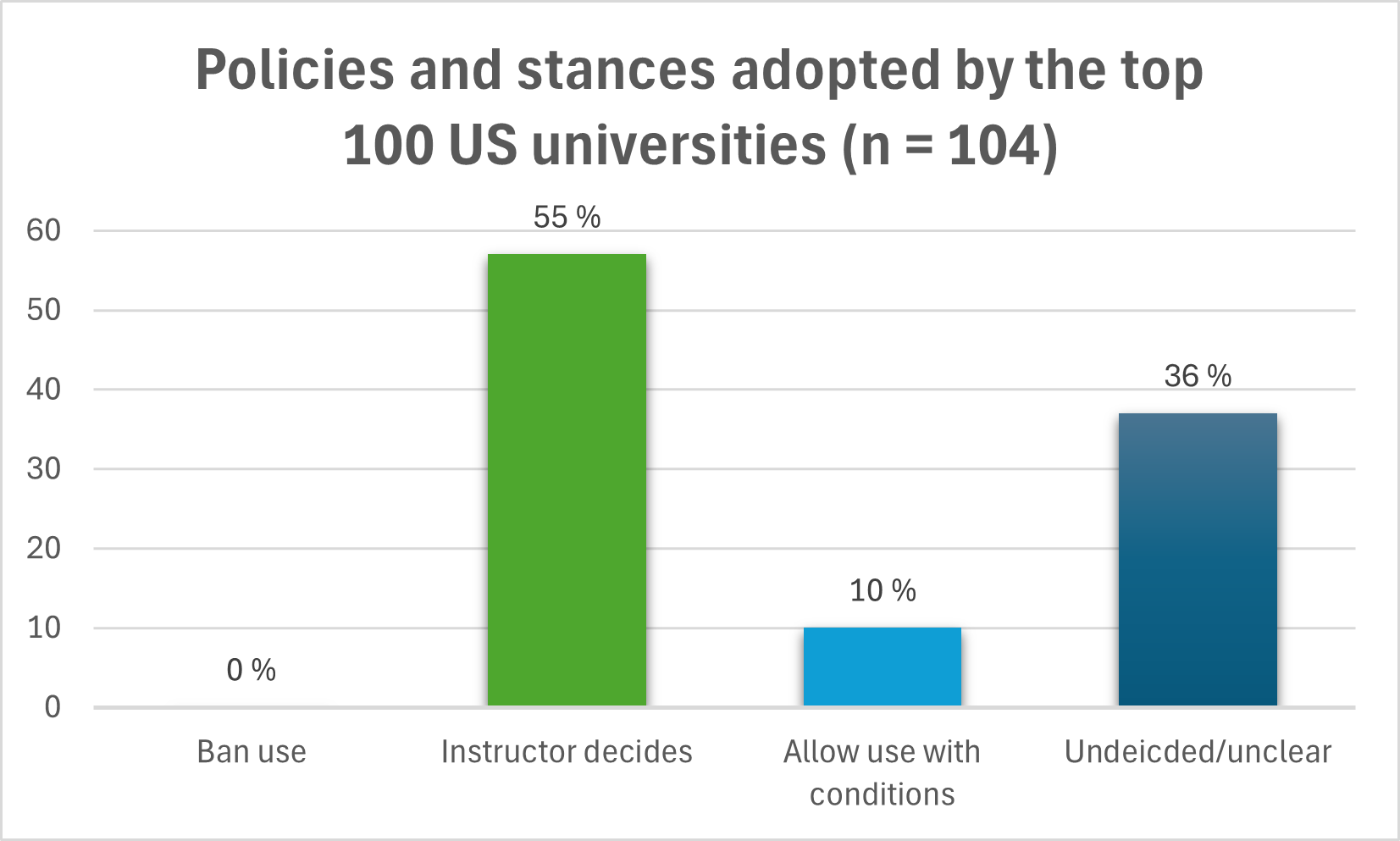
The integration of generative AI into higher education holds immense potential to transform traditional learning, paving the way for more personalized, engaging, and practical educational experiences. During our recent visit to the U.S. East Coast, we had insightful discussions with higher education professionals. These discussions revealed that the journey to widespread AI adoption is still in its early stages; overcoming current barriers could unlock significant benefits for both students and faculty.
How generative AI can revolutionize learning
Our conversations with professors and university administrators underscored that generative AI offers unique opportunities to make learning more adaptive and student-centered, with potential applications spanning several areas.
- Personalized feedback: Generative AI can analyze students’ activities, progress, and skill levels, providing individualized feedback in real-time. This feedback goes beyond typical assessments to give students actionable insights into their performance, helping them refine strengths and address specific weaknesses.
- Experimental learning: Generative AI bridges theory and practice by creating customized learning environments that simulate real-world scenarios. For instance, simulations immerse students in field-relevant case studies, helping them apply theoretical knowledge in a practical context.
- Skill application and soft skill development: Beyond technical knowledge, students can practice essential soft skills such as communication, teamwork, and problem-solving through generative AI scenarios. This experiential approach is particularly valuable for preparing students for dynamic, real-world interactions.
- Objective performance evaluation: Generative AI offers a consistent, unbiased approach to evaluating skills. When AI tools assess complex tasks, such as essays or projects, they provide transparent feedback that may be challenging for human evaluators to deliver consistently.
While generative AI offers robust feedback capabilities, human instructors remain indispensable to the education process, especially in subjective areas like student assessment. The complementary relationship between AI and human educators, highlighted also in recent research (Clegg & Sarker, 2024), suggests that AI enhances rather than replaces human expertise, enabling personalization through adaptive learning.
GenAI can serve as an invaluable tool to refine assessment and feedback, provided that assessment criteria are well-defined. Faculty’s role shifts toward leveraging AI-generated insights to support their evaluations, adding depth and context informed by their expertise, which aligns with traditional roles of educators as facilitators of critical thinking and creativity.
Current landscape and challenges in higher education
Our discussions highlighted several key themes in the shifting landscape of higher education. Generative AI has gained quick traction among students, who use it creatively for various academic tasks. However, unauthorized uses, especially in exams, pose challenges for educators, prompting some to favor in-person or oral assessments as safeguards. This approach can deter misuse but significantly increases educators’ workload.
Faculty responses to AI vary, with some seeing it as a threat to traditional teaching practices. This cautious, often “protectionist,” stance, though understandable, risks overlooking GenAI’s potential benefits. Institutions in the U.S. are still in the early stages of GenAI adoption, limited by a lack of AI-specific tools, a limited understanding of AI’s educational applications, and restrictive IT policies, leaving only a few pioneering educators at the forefront.
Generative AI is also reshaping student expectations and learning dynamics. Today’s students increasingly value hands-on, inspiring learning experiences that align with their future careers, making them more discerning about the relevance of course content. This shift emphasizes the need for university programs to be both engaging and aligned with job market demands.
In multicultural academic environments, interpersonal and cross-cultural communication skills are increasingly critical, preparing students for diverse, collaborative workplaces—a process that generative AI can enhance through simulated, culturally varied interactions.
The availability of AI tools has redefined students’ approach to knowledge creation. With AI-generated content becoming more common, the emphasis on critical thinking and analytical skills has intensified. Educators now face the challenge of cultivating students’ ability to evaluate AI-generated material critically, a crucial skill in the modern business world.
These trends highlight the need for universities to rethink not only curricula but also how generative AI and skills training are integrated, ensuring students are well-equipped for a dynamic, AI-driven professional landscape.
Research insights on policies, resources, and use of AI
A recent study (Wang et al., 2024) on the use of generative AI in U.S. university education emphasizes the technology’s potential to improve learning outcomes through enhanced engagement, feedback quality, and contextualized knowledge application. However, the study also identifies key factors for successful AI integration.
Policies: The study found that many institutions lack structured AI policies, resulting in inconsistent use across departments. Figure 1 summarizes policies and stances adopted by the top 100 U.S. universities (n = 104) on the legality and application of ChatGPT and other generative AI tools. Wang and colleagues recommend universities establish clear, ethical guidelines to encourage AI integration while upholding academic integrity. This can be achieved for example through data stewardship as explained by Clegg & Sarker (2024).

Figure 1. Policies and stances adopted by the top 100 universities (n = 104) in the U.S. regarding the legality and application of ChatGPT and other GenAI tools in higher educational contexts (Wang et al., 2024).
Resources: AI resource availability varies greatly across institutions, with many under-resourced universities lacking the necessary technology and faculty training. The study stresses that investment in infrastructure and faculty training is critical to support broad, equitable AI adoption.
Usage: Generative AI is primarily used for personalized feedback and soft skill simulations, but adoption is uneven. Faculty resistance and limited AI literacy remain significant barriers. Researchers suggest investing in AI literacy programs and policies that support experimentation and adoption of AI-driven teaching tools to maximize potential benefits.
Future directions
The pathway forward involves developing AI tools aligned with academic goals and fostering a mindset among educators that views AI as an ally. With a more open and exploratory approach, generative AI could become an integral part of education, enriching learning experiences and preparing students for the demands of today’s workforce
In conclusion, embracing generative AI in university education requires both innovation and adaptability. Despite legitimate concerns, the benefits far outweigh the challenges. By leveraging GenAI’s strengths in feedback, contextualization, skill development, and unbiased assessment, universities can create a more dynamic and personalized educational experience—equipping students with the skills needed to succeed in a rapidly evolving world
Authors

Perttu Dietrich, Ph.D., CEO, LessonLab Oy

Jere Lehtinen, Ph.D., COO, LessonLab Oy
References
Clegg, S., & Sarker, S. (2024). Artificial intelligence and management education: A conceptualization of human-machine interaction. The International Journal of Management Education, 22(3), 101007. https://doi.org/10.1016/j.ijme.2024.101007
Discussions with U.S. East Coast university professors and staff were conducted between November 4-8, 2024. The U.S. visit was part of LessonLab’s “Mission Transatlantic” project funded by the Centre for Economic Development, Transport, and the Environment.
Wang, H., Dang, A., Wu, Z., & Mac, S. (2024). Generative AI in Higher Education: Seeing ChatGPT Through Universities’ Policies, Resources, and Guidelines. Computers and Education: Artificial Intelligence, 100326. https://doi.org/10.1016/j.caeai.2024.100326











